|
Alden Rice Grout (November 4, 1817—March
2, 1862, age 44) Site Links: |
Page Index
Overview of the Gold Rush
My Heckart/Missouri connection to the Gold Rush
Heckart burials at Clear Creek in California
Descendents of John Adam Jr. Heckart to date
Monroe and Shelby County Missouri 49er's
The Grout Letters on the way to the Gold Rush
Grout Letters from the Gold Fields
Cost of supplies around the Gold Fields
The 49'er's, a quick overview on the Gold Rush before moving on to the letters of Alden Rice Grout---
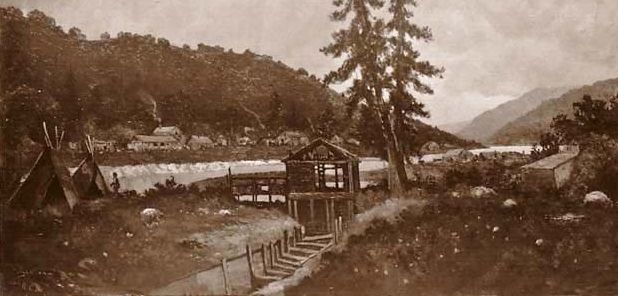
Sutter's Mill, where it all started
....There were rumors and reports in 1848 of gold in California, but when
President James K. Polk told Congress about the gold in California the rumors
were confirmed. The golden dreams were true, creating a restlessness that
poured a human tide into San Francisco bay and sent hundreds of caravans over
plains and mountains.''
.....From the east coast, the emigrants sailed for California, but from the
middle west--which had been a frontier itself only 20 or so years before, the
travelers headed for the Missouri, which was where the trees ended; across the
river was the wilderness. The west.
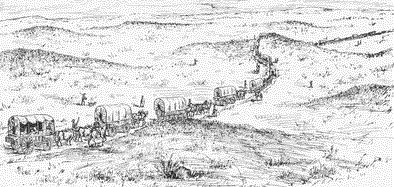 ....From the
eastern states, after a voyage down the Ohio River and up the Missouri at St.
Louis to St. Joseph, as far as the eye could see was the great emigration.
One could see nothing but wagons. The town presented a striking appearance--a
vast army on wheels--crowds of men, women and lots of children and last but not
least the cattle and horses on which life depends. St. Joseph--everybody
called it St. Joe--was the end of the continent.
....From the
eastern states, after a voyage down the Ohio River and up the Missouri at St.
Louis to St. Joseph, as far as the eye could see was the great emigration.
One could see nothing but wagons. The town presented a striking appearance--a
vast army on wheels--crowds of men, women and lots of children and last but not
least the cattle and horses on which life depends. St. Joseph--everybody
called it St. Joe--was the end of the continent.
....Across the wide Missouri (river) in the 1840's was an almost unknown
land. California, which had a European population of 15,000 and an Asian
population of three. Now has 33+ million people and an economy larger than
Italy.
 ....St. Joseph,
Missouri, a small river city is part of the heartland of America now, but once
it was the edge of the world, the place where the United States ended and the
west began. It was the frontier, where the trail to California started; in
a sense, this was where California began, because from here and from three other
small Missouri River towns the great migration to the Gold Rush started.
Other towns were Independence and Westport, Mo. and Council Bluffs, Neb., but in
1849 St. Joseph was the principal place to start. It was a town of 1,500 people,
only six years old and teaming with young men, a few women, clouds of dust,
herds of cattle and oxen, and brand new wagons, all heading to California.
....St. Joseph,
Missouri, a small river city is part of the heartland of America now, but once
it was the edge of the world, the place where the United States ended and the
west began. It was the frontier, where the trail to California started; in
a sense, this was where California began, because from here and from three other
small Missouri River towns the great migration to the Gold Rush started.
Other towns were Independence and Westport, Mo. and Council Bluffs, Neb., but in
1849 St. Joseph was the principal place to start. It was a town of 1,500 people,
only six years old and teaming with young men, a few women, clouds of dust,
herds of cattle and oxen, and brand new wagons, all heading to California.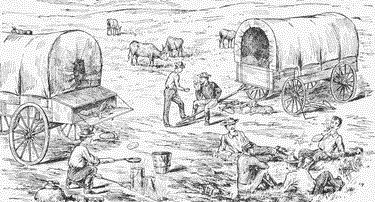 ...Many people
came to California by covered wagon. This was a long, difficult journey. Travelers
needed to travel across difficult land. They needed to cross the desert and
climb the mountains with their wagons, mules and oxen. It was very
important that the travelers left early enough so not to get caught in the
Sierra Mountains during the winter. Many were aware of the tragic fate of the
Donner party in 1846. Coming by land with covered wagons had its
advantages. Travelers could pack a lot more gear. They would pack a cooking
stove, plates and cups, and forks and knives. They would carry enough food and
supplies for a 6 month journey. Food was usually bacon, ham, rice, dried fruits,
bread, flour, sugar, rice, molasses, butter, coffee and tea. Overland
travelers would take tools for mining, farming, and fixing the wagon. They also
took guns and ammunition, and clothes and blankets. All of this had to be
carried in a wagon about 9 feet long and 4 feet wide. Some travelers also
brought cattle and chickens to provide food. This was a difficult route.
People were often poorly prepared. Many people died during the trip from
illness, starvation and drowning.
...Many people
came to California by covered wagon. This was a long, difficult journey. Travelers
needed to travel across difficult land. They needed to cross the desert and
climb the mountains with their wagons, mules and oxen. It was very
important that the travelers left early enough so not to get caught in the
Sierra Mountains during the winter. Many were aware of the tragic fate of the
Donner party in 1846. Coming by land with covered wagons had its
advantages. Travelers could pack a lot more gear. They would pack a cooking
stove, plates and cups, and forks and knives. They would carry enough food and
supplies for a 6 month journey. Food was usually bacon, ham, rice, dried fruits,
bread, flour, sugar, rice, molasses, butter, coffee and tea. Overland
travelers would take tools for mining, farming, and fixing the wagon. They also
took guns and ammunition, and clothes and blankets. All of this had to be
carried in a wagon about 9 feet long and 4 feet wide. Some travelers also
brought cattle and chickens to provide food. This was a difficult route.
People were often poorly prepared. Many people died during the trip from
illness, starvation and drowning. 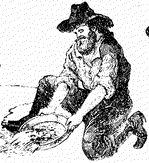 ....In
the early days gold was easy to find. All you needed was a knife, pick, shovel
and a pan. Gold nuggets could be pried from rocks. Dirt shoveled from creeks and
rivers could be swirled in a pan to find gold. Gold is heavier than sand or
gravel. Miners would swirl sediment from a river in a pan of water. The sand and
dirt would float in the water and could be poured off leaving heavy rocks, and
hopefully gold.
....In
the early days gold was easy to find. All you needed was a knife, pick, shovel
and a pan. Gold nuggets could be pried from rocks. Dirt shoveled from creeks and
rivers could be swirled in a pan to find gold. Gold is heavier than sand or
gravel. Miners would swirl sediment from a river in a pan of water. The sand and
dirt would float in the water and could be poured off leaving heavy rocks, and
hopefully gold. 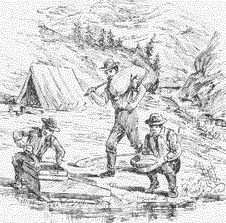 ....Most
miners lived in tents and cooked their food over an open fire. Meals were
usually beans, bacon or local game cooked over an open fire...Most camps and
mining towns were canvas tents or wooden buildings. Fires were very common. Many
camps and towns were completely destroyed by fire. Some several
times.
....Most
miners lived in tents and cooked their food over an open fire. Meals were
usually beans, bacon or local game cooked over an open fire...Most camps and
mining towns were canvas tents or wooden buildings. Fires were very common. Many
camps and towns were completely destroyed by fire. Some several
times. My connection to the 49'er' of Missouri:
Adam and Florian Heckart are my ggguncles. Both would travel to the gold
fields with Alden Grout and others from Monroe and Shelby County. The
surnames below are very common family names in NE Missouri. Many of these
men were veteran pioneers. Almost all of them had the multitude of skills
and crafts needed to build, travel, farm. These are physically tough,
hardened men with great survival skills. Most of these men had been in NE
Missouri for at least 5-10 years, when the area was still frontier land.
They had learned frontier skills from their fathers. Trained and hardened,
when this group received the word of gold in California, they were already on
the frontier with the skills to set out for the gold field and make a successful
trip. They had wagons and oxen, tools and supplies of their own.
They were "ready to go." Thus most of these men were very
successful in making the trip while others from farther to the east were not
only behind in time and distance, but also behind in the "training"
needed to make a successful trip. The trail west would be absolutely lined
with equipment and bodies of men and animals, but not the men of the Missouri
frontier. Many of the men from NE Missouri were also successful in the
gold field because of their background skills and work ethic.
....The Heckart brothers would return within two years to NE Missouri.
Adam Heckart's family had a close link with the family of
his sister, John and Elizabeth Heckart Strayer.
While Adam was away at the gold fields, his family would live with the Strayer
family at Clinton/Jonesburg, on the Salt River in Monroe County, Missouri.
Adam Heckart and John Strayer would move to Freeport, Winnishiek County,
Iowa, in late summer 1852, to build a major mill on the Upper Iowa River.
Two Heckart families, John Adam Sr and Jost, and a young 20 year old John Strayer moved to NE Missouri in
1838 and had been river men, millwrights and farmers on the Susquehanna River
Valley in eastern Pennsylvania. The sons of John Adam Sr. and John Strayer would
be involved in the building of the mill for Mr. Walker in Shelby county and run
the mill at Walkersville from 1840-1848. By probably the winter of 1848,
John Strayer and Adam Heckart would buy lots in Clinton/Jonesburg, plus the
grist/carding mill and land. Adam Heckart's family would stay under the
leadership of John Strayer while he was away. Adam probably returned in
1851. While in California the Heckart brothers, Adam and Florian,
apparently struck off from the Weberville area where Alden Rice Grout stayed
until returning to Shelby County. One has to speculate the Heckart
brother's being experienced river men and mill wrights, felt very comfortable
"exploring" river systems in and out of the mountains to the north of
Weberville.
Adam Heckart would remove with John Strayer in late summer
1852, to Freeport, in NE Iowa. They would build a major mill similar to
the one they were involved in building at Walkersville. John Strayer would
remain in Freeport and run the mill until his death in 1878. In 1865, Adam
Heckart would set out once again for gold country by wagon train. His family
would remain in Butte Co, around Oroville, with many of the next generation
remaining in Butte County, California. Other Heckart lines would also move
west. By the late 1860's only the Florian Heckart line would remain in
Shelby County, Missouri, while the Jost Heckart line would remain around Ralls
and Green Counties, Missouri, or move into Wapello Country around Ottumwa,
Iowa. Thus the results of the gold rush had a significant influence on my
family. One has to speculate that the gold brought back by Florian Heckart
was used to buy land in Shelby County and keep him there the rest of his
life. Gold probably helped build the big mill in Freeport, Iowa in
1853. Gold experience brought Adam Heckart back to California in 1865,
where he would use his millwright experience to build a major flume on the
Feather river. Great men, great times, the Missouri Connection.
Heckart burials in California
Link to Clear
Creek Cemetery, Butte County, California
Burial location of John Adam Jr. and Elizabeth Boyd Heckart and some of their
offspring.
Lat: 39°39.48N, Lon: 121°36.50W
Contributed by Stan Carman, Mar, 26, 2001.
Total records = 268.
Clear Creek Cemetery is located 6 miles South of Paradise, Butte County,
California, USA off of Highway 191 on Clear Creek Cemetery Road. Highway 191 is
also known as Clark Road.
Stone inscriptions for the Heckart clan in Clear
Creek Cemetery:
Heckart, Adam, d. 1 Sep 1897, age: 84y
Heckart, Catherine L, b. 15 Oct 1848, d. 4 Apr 1926
Heckart, Elizabeth, d. 25 May 1903, age: 86y
Heckart, Emily G, b. 8 Oct 1855, d. 6 Apr 1933
Heckart, Francis A, b. 6 Dec 1852, d. 15 Feb 1928
Heckart, William B, b. 26 Oct 1839, d. 13 Aug 1933
Heckart, William B, d., Co I 2 IA. INF
And other possible family connections:
Boyd, Alice, b. 1867, d. 1898, Mother
Boyd, Martha, d. 25 Feb 1892, age: 66y
Hefner, Ralph Heckart, d. 1992
Descendants of John Adam
Heckart, Jr.
(NOTE: as of May 2001, this is all of the
Heckart data I have regarding the family of Adam and his removal to
California. If you are linked to any of these lines and can supply some
information, please post.) iowaz@swbell.net
1 John Adam Heckart, Jr. b: July 19, 1813 in Northumberland Co., PA d: September 01, 1897 in On ranch, Mesilla Valley, 6mi S of Paradise, Butte Co, CA Burial: Clear Creek Cemetery, near Pentz, Butte Co, CA Migrated: 1865 Pentz area of Butte Co, CA Note: 1849 Went to the gold fields, returned 1851. Note: 1849 Went to the gold fields, returned 1851. Occupation: Bef. 1838 Mill Wright, farmer, river pilot.
- +Elizabeth Boyd b: Abt. 1817 in PA d: May 25, 1903 in Pentz area of Butte Co, CA Burial: Clear Creek Cemetery, Butte Co, CA m: in Butler Co., in western PA Note: Bk A, #083 Note: Bk A, #083 Note: Bk A, #083
-- 2 Mary Elizabeth Heckart b: 1837 in Butler Co. in western PA d: 1865 in Wagon train to Calif., after giving birth.
----- +Henry C. Snyder m: May 13, 1858 in Freeport, Winneshiek Co., Iowa
------ 3 William Snyder b: 1860 in Freeport, Winneshiek Co., Iowa
------ 3 Fannie Mae Snyder b: 1863 in Freeport, Winneshiek Co., Iowa
------ 3 Alice Snyder b: 1865 in On wagon train, in CO, mother died during birth.
-- 2 William Boyd Heckart b: October 26, 1838 in Shelbyville, Shelby Co., MO d: August 13, 1933 in Oroville, CA Burial: Clear Creek Cemetery, Butte Co, CA Occupation: 1884 Miler on Pentz Ranch
----- +None
-- 2 Christiana Ann Heckart b: 1842 in Shelbyville, Shelby Co., MO d: 1892 in Colusa, CA Note: Married older, no children. Note: Married older, no children. Occupation: Teacher
----- +William Jasper
-- 2 Nancy J. Heckart b: 1844 in Shelbyville, Shelby Co., MO d: in Oroville, CA Note: Had many children. Note: Had many children.
----- +John P. Leonard Occupation: Judge
-- 2 Catharine Louise Heckart b: October 15, 1848 in Shelbyville, Shelby Co., MO d: April 04, 1926 in Oroville, Butte Co, CA Burial: Clear Creek Cemetery, Butte Co, CA Note: Never married Note: Never married
----- +none
-- 2 Francis Augustus Heckart b: December 06, 1852 in Freeport, Winneshiek Co., Iowa d: February 15, 1928 in Oroville, Butte Co, CA Burial: Clear Creek Cemetery, Butte Co, CA Note: Older when married, no children. Note: Older when married, no children. Occupation: 1884 Farmer at Pentz Ranch
----- +Annie Pearce
------ 3 Joseph Heckart
-- 2 Gertrude Emily Heckart b: October 08, 1855 in Freeport, Winneshiek Co., Iowa d: April 06, 1933 in Oroville, Butte Co, CA Burial: Clear Creek Cemetery, Butte Co, CA Note: Never married. Note: Never married.
----- +None
1849 California emigrants from Monroe
Missouri
John Sears, Alexander Mackey, Hugh Glenn, Frank Buckner, William Buckner, Daniel
Good, Jefferson Wilcoxon, D. A. McKamey, James Bridgford, Jefferson Bridgford,
George Waller, James Waller, Thomas Withers, James Glenn, James Hill, Wesley
Hill, Stephen Hill James H. Smith, Boon Helm, David Helm, Fleming Helm, Samuel
Sproule, Samuel Gaines, George Kipper, Joseph Donaldson, Alexander Thompson,
Joseph Thompson, John Thompson, John Poage, William Poage, Thomas Cleaver,
Thompson Holliday, William Holliday, Marion Biggs, Thomas Farley, Green
Featherstone, Charles Featherstone, William Williams, Curren Foreman, Edline
Chapman, David Heninger, Joseph Heninger, Thomas Dry, Benjamine Davis, Hiram
Collins, John M. Bates, Saul Threlkeld, Jesse Allen Harrison Williamson, Will
Sparks, John Goe, George Goe, Isaac Stalcup, George Bondurant, Vincent Worland,
James Worland, Zimmerman Zigler, Malk Ashcraft, Adam
Heckart, James Gough, James Lasley, William Gibson, David Craig, David
Major, William Gilbert, Frank Williamson, Gose McBroom, Thomas Maupin, Taylor
Barton, William Fitzpatrick, William
Greenwell, Dr. Marcellus Gough.
1849 California emigrants from Shelby
County, Missouri
John F. Benjamin, J.M. Collier, William Dunn, John Dickerson, Capt. J.A.
Carothers, Dr. Mills, C. M. Pilcher, Benjamine Forman, Bob Marmaduke (slave),
Joe Dunn (slave), Calvin Pilcher, William Robinson, Charles Rackliffe, Lafayette
Shoots, John, Robert and William Montgomery, Robert and Newton Dun and Florian
Heckart.
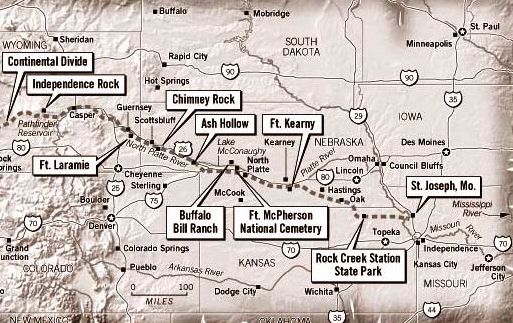
THE GROUT LETTERS
Information supplied by Barbara Greenwell, RR, Shelbina, Missouri, 2001. Keeper of the original Grout letters.
The gold Rush of 1849 holds a special thrill for a rural Shelbina, Missouri, native, Anna Ryan Greenwell. In the spring of 1849 her maternal grandfather, Alden Rice Grout, left his home and family to strike out for the gold fields of California. The letters Alden wrote to his wife Harriet Ann Gough Grout, while he was away for two years seeking his fortune, give a detailed record of the dangers, difficulties and uncertainties experienced in his travels. These letters also stand for the life of the other Monroe and Shelby County, Missouri, early pioneers who traveled west.
The Grout family emigrated to the Midwest from Essex County, Vermont in the 1830-‘s and early 1940’s. They were straight-laced New Englanders, and found life in Missouri very difficult compared to what they had experienced in Vermont. They were educated and came as teachers to the frontier territory. Grandpa Alden Rice and his maiden sisters, Prudence Helen and Harriet S. John Grout taught some of the earliest schools held in NE Missouri. Their father, Reuben S. Grout is buried in the Salem Baptist Cemetery, northeast of Paris in Monroe County.
It was the lure of gold, or as many termed it, "gold fever," that caught Grout’s imagination, and like so many other able-bodied men of Shelby and Monroe Counties, he planned his trip and left in early April, 1849.
 Letters from Alden Rice Grout (1817-1862) from the journey to the 1849 Gold
Rush, to his wife back in Shelby County, Missouri, Harriet Ann Gough Grout
(1817-1863)
Letters from Alden Rice Grout (1817-1862) from the journey to the 1849 Gold
Rush, to his wife back in Shelby County, Missouri, Harriet Ann Gough Grout
(1817-1863)
The Gold Rush of 1849 through the letters of
Alden Rice Grout (1817-1862)
Published in the Shelbina Democrat, Wednesday, April 11, 1979.
Information supplied in 2001 by Barbara Greenwell, gggranddaugher of Alden Rice
Grout, RR, Shelbina, MO. Letters from Alden Rice Grout (1817-1862) from
the journey to the 1849 Gold Rush; most were sent to his wife back in
Shelby County, Missouri, Harriet Ann Gough Grout (1817-1863)
****Introduction
....The gold Rush of 1849 holds a special thrill for
a rural Shelbina, Missouri, native, Anna Ryan Greenwell. In the spring of 1849
her maternal grandfather, Alden Rice Grout, left his home and family to strike
out for the gold fields of California. The letters Alden wrote to his wife
Harriet Ann Gough Grout, while he was away for two years seeking his fortune,
give a detailed record of the dangers, difficulties and uncertainties
experienced in his travels. These letters also stand for the life of the other
Monroe and Shelby County, Missouri, early pioneers who traveled west.]
....The Grout family emigrated to the Midwest from
Essex County, Vermont in the 1830-‘s and early 1940’s. They were
straight-laced New Englanders, and found life in Missouri very difficult
compared to what they had experienced in Vermont. They were educated and came as
teachers to the frontier territory. Grandpa Alden Rice and his maiden sisters,
Prudence Helen and Harriet S. John Grout taught some of the earliest schools
held in NE Missouri. Their father, Reuben S. Grout is buried in the Salem
Baptist Cemetery, northeast of Paris in Monroe County.\
....It was the lure of gold, or as many termed it,
"gold fever," that caught Grout’s imagination, and like so many
other able-bodied men of Shelby and Monroe Counties, he planned ;his trip and
left in early April, 1849.
Excerpts from the letters follow:
April 15, 1849, four miles east from
Ketysville, (Missouri)
.…The roads are lined with California bond wagons. We have passed many teams
(oxen) on the road that ;will hardly reach St. Joseph, )Missouri), let alone
California. Our teams are considered about the best that have passed ;this road,
and we have passed through some of the worse places on the road ;that I ever saw
wagons go, without difficulty We travel about 12 miles a day, could travel
farther but we hear that corn is very scarce near St. Joseph and are in no hurry
to get there before grass comes.
April 22, 1949, four miles west of
Richmond (Missouri), Ray County
.…We also have terrible accounts of the cholera at
St. Joseph and camp fevers… Perhaps you would like to know our way of keeping
camp. Well, I will tell you something about our different service. Mr. Miner and
Donaldson each drive teams and are thereby exempt from further duty. T.
Glasscock and myself attend to the cooking department, E. Steele and John McKey
to feeding the teams. I have great success in baking wheat bread, find it not so
difficult as I had expected. I have not yet tried the hop yeast but think I
shall be successful, we all have the most voracious appetites of any six men you
ever saw.
May 3, 1849, Savanna Ferry, 10 miles
above St. Joseph, Mo.
.…Mr. Miner will hand you this, and will tell you of my situation better than
I can, under existing circumstances, write it. I regret very much his declining
going with us, for many and various reasons, but as he thinks it prudent to
return I must submit to it. I myself was very near returning back with him as it
looks quite discouraging to see so many thousands going on, and I may many times
wish I had, but you know if there is anything like a good chance to get to
California I want to be one of the number that go. Our oxen are the best on the
road, we have good wagons and not very heavy loads, and ;it does seem that our
chances to go through more than an average one. Mr. Miner will tell you abut the
cholera, smallpox, emigrants….
May 10, 1849, Great Nemaker Agency
(Kansas)
….If you could see me at this time, I doubt not you would say, "O Mr.
Grout: Go back to Monroe (County, Missouri)! But ;it seems as difficulties and
trials arise, I am the more anxious to ‘conquer or die’….. We have
attached ourselves to a company consisting of persons from Monroe and Shelby
County. Dr. Williams of Monroe is captain. I am much pleased so far with the
company and officers. In our company from Monroe are the Kirkland's, Jo West, Bog
Austin, Messrs. Hickman, Heckartz, and from Shelby County, Radcliff, Dr. Mills,
Caruthers, Pilcher, Parker, all of whom are first rate fellows and mostly old
acquaintances.
June 15, 1849, near Fort Laramie
(Wyoming)
.…I stated we had separated from Dr. Williams’
Company. I will now write more particularly about the separation and present
prospects. Dr. Williams’ company, styled the "Salt River Emigration
Company" at one time consisted of 32 wagons, mostly from Monroe and Shelby
Counties. They had a constitution whereby all who signed it were bound as a bond
of brothers, to assist each other, through thick and thin, until the journey’s
end. They had a list of by-laws as long as the moral law to govern and keep
order among the members. A captain and score or more of other officers were
;elected to execute and put in force these laws and regulations. When our wagons
joined or agreed to travel with Dr. Williams and some of the number above
mentioned. Wagons, with heavy loads and rather indifferent ;teams were attached
to the company by which means according to the constitution those who had good
teams and lighter loads (like us) became bound to help in all probability these
heavy wagons through and get neither pay or thanks for it. It is plain to see
before an organization of this kind can be made to be equally fair, each should
have very nearly the same amount of freight and team. Another difficulty was
some were in favor of having their oxen tied up, others of having them carelled
in, driven into an enclosure made by the wagons, and chains, others wished their
oxen to range unrestrained wherever they wished to go. Our captain, as good and
clever a man as ever lived wished to please all, the consequence was, nobody was
please, but there was no open war, still I think those who still cling to the
original company look upon those who have left as being s et of rather
unprincipled men. I suppose we are some 30 miles in advance of Dr. Williams’
company, if they do not start earlier in the morning than they did when we was
with them. I have no time or space to mention several other reasons why we
separated nor should I be so particular in those mentioned but presume there was
misrepresentations of our separations sent back. We are now travelling along in
peace and harmony, eight wagons of us together. Adam
Heckhartz (Heckart) and brother (Florian), J. and J. Kirkland, Z. Zigler
and Greenwell, Dr. Mills of Shelby County and others you are not acquainted
with.
….We hear of the cholera having been very fatal on the emigrants behind us;
for the last two or three hundred miles we have passed but very few graves, but
the first 300 (miles) after leaving St. Joseph we passed a great many, three of
whom killed themselves by the accidental discharge of their guns. I am inclined
to think there is as yet no cholera ahead of us, but it may be with us any
moment. The weather for some days back has been rainy or rather we have had
severe storms of rain and some of the sharpest lightning I ever saw….We are
now about one their of the way from St. Joe to San Francisco, if we meet with no
serious difficulty we will reach the gold diggings sometime in September (1849)
Dr. Bower is somewhere ahead of us, probably 100 miles. Let Mr. Steele’s folks
know that Edger is in good health and fine sprites. I ell you he is no. 1 in our
crowd and no mistake…
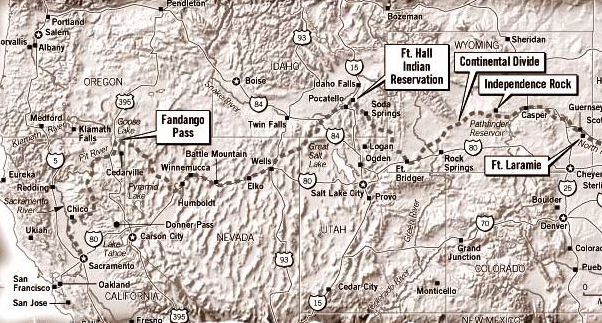
July 7, 1849,
on Green River, 75 miles west of the South Pass
.…We are getting along thus far without anything
like serious difficulties, all are in good health and fine sprits; our oxen are
in nearly as good condition as when we left Missouri. This cannot be said
however of all the cattle in our company, some half dozen are now dead and some
others are in bad condition. Kirkland's and Gibson's and Co. have left one wagon
and joined teams, another wagon of our company has been left and men and teams
distributed out. We have taken Wm. Greenwell into our mess, he having lost one
of his oxen and his mess broke up. By his coming into our mess with provisions
and baggage, we were obliged to lighten our loads by throwing out our blacksmith
tools. There is now six wagons of us in company. We have now just got across a
stretch of what is called "Subletts cut off" of 51 miles ;without one
drop of water for our oxen, it is laid ;down in guide books as 35 miles, but
have proved 51 by measurement. Oxen stood the trip without seriously injuring
them. For about 100 miles east of the South Pass the ground in places is white
with alkali, the water also in places is strong with it. Cattle seem fond of
eating and drinking it, and the consequence is that those who have not guarded
their cattle with the utmost vigilance have lost at least a part of their teams.
I do not think I would overrate the number of dead oxen we have passed in the
last 150 miles f I should say 1000. The road is literally lined with them. In
one day I counted for 12 miles and made the number in sight of the road 23. I never
saw or even heard of nothing to compare with the destruction of property
on this route and back of us I know must be a great deal worse. IN viewing the
dead oxen and deserted wagons, tools, chains, and clothing strewn along the road
I can think of nothing that I ever read of to compare with it except Bonapart’s
Excursion to Russia…
….We possibly can on account of there being such an immense throng behind us.
It is thought all that are before us will get through, if they did not drive too
hard, but what is to become of those back it is fearful to think about. When I
wrote you from Laramie it was thought there were about 3000 teams in advance of
us, the number now is from 15 to 20 hundred (20,000). Perhaps you will infer we
are rushing too hard, but I will explain how it is we pass so many. Some whom we
pass rushed too hard at the start and have broken down their teams, others
started with indifferent teams and they are obliged to drive slow, others are
too lazy to guard their cattle at night to graze and cannot start soon in the
day or travel late in the evening. Our method is to have the oxen up eating
before day, start soon after sunrise, stop through the hottest part ;of the day
to rest our teams. Some of us also are always ahead of the teams looking out for
a good little spot of grass, so you will see that we have a plenty to do to keep
us pretty busy. I have found men on the route who know something about every
body I was ever acquainted with I believe, some who are well acquainted with our
connections in Wisconsin, also a Mr. Pinkum from Lancaster, N.H…. By the time
you receive this if all things go well with me I shall be in the gold diggings,
say sometime about the last of August or first of September. I hope and
sincerely pray all may be well with you and may dear children and that I may yet
live to see you all well and happy. But life is so uncertain and the time I have
set to be away so long that it seems as ;if our chances to meet or to be forever
separated in this world about equal, but dear Harriet, our lives, if prolonged
to the oldest age, cannot be brought into comparison with the never ending ages
of Eternity. Then let us strive by all means to spend our eternal life
together, and do all in our power to raise our children that they to may meet us
in that happy world. Since starting this trip I have more than ever been brought
to think of death and futurity and to consider what could by my condition if I
should die knowing that I was still in the ‘gall of bitterness and bonds if iniquity.’ These reflections I have kept to myself and are known to no one but
to you and my God. I have joined no church or creed, but hope a merciful God has
blotted out my numerous transgressions, and will receive me at last as a
wanderer home. Harriet ;this letter is for you and sister P.H…….
….Tell Mr. Greenwell’s family that William is in good health and is doing
well. Also. E. Steele, T. Glasscock are all in excellent health. John McKey
would be well if he did not eat so much. J. Donaldson is well. Adam and Florian
Herchartz (Heckart) are well, so are Jacob and John Kirkland. John Quigley, Z.
Zeiger, M. Ashcraft are all in good health and in our company. Dr. Bower’s
company is supposed to be about 4 days advance of us. James Quigley died of
cholera a few weeks since near Fort Laramie. No cholera near us, nor do we ever
see any graves on the road now.
.…Tell Herbert I think of him a great many
times every day, but on his birthday I shall think of him more than ever. Poor
boy, it is hard for me to think it doubtful if I ever see you again, and to
think of him more world it is for you to battle with. Tell Selden he must not
forget how I look for if he does, I might go by when I come back to see him, for
he will be such a great big boy I might not know him. Harriet Ellen knows so
little of me, that it is not worthwhile to write to her---I am foolish enough to
mark a little place here and seal it with a kiss for you all." Your
affectionate,/s/Alden Rice Grout (1817-1862)
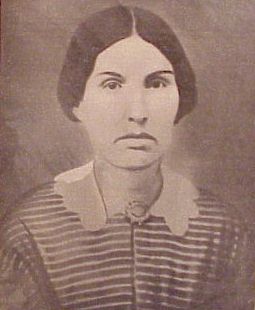
September 16, 1849, California
Dear Harriet, …Here I am at last in the midst of the gold diggin!! I am in
good health and as good spirits as the nature of the case will admit of. It
would be as unnecessary as impossible for me to attempt to narrate anything like
an account of the difficulties and trials of our trip across the plains, but
let it suffice for the present that we arrived here on the 8th
(September), all in good health, and quite strange to relate with every one of
the oxen we started with.

November 14, 1849, Weaverville, California
NOTE
Weberville is gone, it is now Stockton, California: The town of Weberville (aka
Weaverville), was one of the first places overland immigrants stopped upon
arriving in the area between 1848 and 1852. In 1849, near where gold had
been discovered at Sutter's Mill, Charles Weber and his partner, William Gulnac,
started a store and then a town, Weber's Camp or Weberville. Unlike Stockton,
which Weber also founded, Weberville was one of the many towns that failed to
survive beyond the excitement of the Gold Rush. The county seat of San Joaquin
County, California, also is named for the navel officer Robert Stockton..
It was Captain Charles M. Weber, the river town’s founder, who changed the
name–
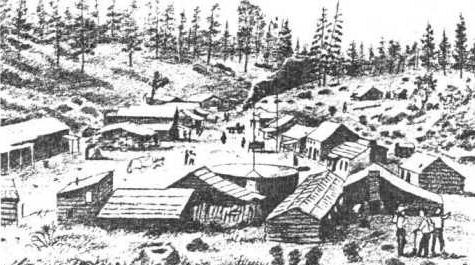
.…Not having heard one word from you or any of
my friends since leaving home I sometime since declared I would not write to
anyone again until I should receive a letter from the states, but I may have
been wrong, for the fault may not be in my friends so much as in the mails,
which are very irregular and uncertain.
.…It is unnecessary for me to write my anxiety
about you and my children. If not unnecessary it is impossible. Had I
thought or conceived before leaving home that by going to California I could not
even hear from you for 7 months. I certainly should have stayed at home. How
much longer I am to wait God only knows. I trust it has been different with you
in relation to myself. I have since leaving embraced every opportunity of
sending you letters, some of them at least have reached you.
.…I am still at the same place where I was
when I last wrote you, in good health and would be in good spirits could I know
that you and my relation at home were well. I hope for the best, but shall
endeavor to be prepared for the worst. Brother Samuel is with me is also in good
health. We are tolerably well fixed for the winter in company with Will
Greenwell and two other men from Illinois. We have a comfortable cabin and
provisions in pickled pork, hard bread and flour to do us until spring.
.…Pretty rough living here I assure you, as
well as very expensive, not having much else to write about I will just state
the prices of some things at this time and place, in some parts of the country
things are much higher, in other portions lower.
.…Flour 75 cents per pound. Fresh beef 50
cents. Salt pork 75. Onions only $1.50 per pound. Potatoes $1. Other eatables in
proportion. Boarders are paying from $20 to $25 per week for board without
lodging. The rainy season having commenced it s thought prices will come up a
little soon. It is supposed by many that the retail price for flour here by new
year will be $2 per pound. There seems to be no apprehensions abut starvation,
for notwithstanding the numerous population, provisions though high will be
abundant. You of course from the above "prices current" will suppose I
must be making money pretty fast to be able to live. Well I will tell you how it
is. We bought us a team some weeks since and bought our winter’s provisions at
Sacramento City, at the following rates. Flour $15 per 100, salt pork $48 per
barrel, which is much cheaper to us than buying at this place. Had we kept or
purchased a team when we first came here and gone to hauling, we probably could
have done well. We keep the team still hauling and may yet make something at it,
though the roads since the rain have become very bad. Also there is no feed for
stock between this place and the city (50 miles) and feed for cattle and mules
is pretty high. Hay $10 per 100lbs., corn meal $25 per barrel. "Ain’t
California some" as Selden used to say?
.…I wish I could write you as flattering an
account of success digging gold as some persons of my acquaintances have had,
but I cannot inform you of any great success as yet, still I have done better
than some. I have yet hopes, if life and health is spared, to return next fall
somewhat better off than when I left, certain it is I shall try hard enough.
Digging gold is a very hard and uncertain business. I do not believe one half
the miners in California will more than support themselves this winter.
.…But could you see the result of brother
Samuel, myself, and another man’s work today, you would think we were getting
rich fast. We washed out five ounces and one half of the pure metal valued here
$16 per once, but such luck does not happen to us often, I assure you. One day
however I did by myself take out $79, but I was nearly a week digging off the
dirt before I got down to the gold!! David Moss has cleared about $2,000,
Armstrong of Paris (MO) about the same I am informed. They are on Middle Fork
about 25 miles from this place. Jo Rogers has had very good luck also, is now at
work for Hawkins of Hannibal driving teams at $250. I saw John Nickles not long
since, he has %400 he told me which he wants to send home. Edger Steele and the
other boys that came with me left here for the Middle Fork some after we came in…I
do not know their success. Heckhartz,
Kirkland's, Henninger and Gillespie have gone somewhere to the south where they
expect to find H. Henninger and richer diggings. I have not heard from them
since they left, although Heckhartz
promised to let me know if he found a chance for a fortune. There is, you will
discern, neither form nor order in this letter, as I write about things just as
I happen to think of them. How can anyone fashion into form a letter in
California!! I can’t, nor shall I try!
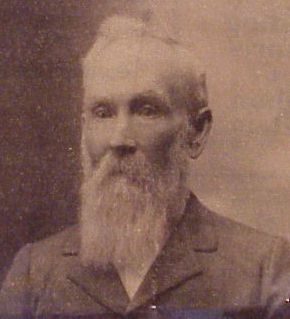 Thomas Edgar Steele of Monroe County, Missouri traveled to California by
wagon train with Alden Grout to work the gold fields. His father David Steele,
died in 1850 while he was away. He stayed in California nearly three years
before returning home by way of the Isthmus and New Orleans. He made a second
trip to California around 1854 or 1855 to take a drove of livestock, but
returned home soon after.
Thomas Edgar Steele of Monroe County, Missouri traveled to California by
wagon train with Alden Grout to work the gold fields. His father David Steele,
died in 1850 while he was away. He stayed in California nearly three years
before returning home by way of the Isthmus and New Orleans. He made a second
trip to California around 1854 or 1855 to take a drove of livestock, but
returned home soon after.
.…I wrote you in my last something about
renting the farm to Mr. Roby; I wish you and G.B. Gough to fix that matter as
circumstances may seem best. You know Harriet the place I designed for an
orchard. I wish you would contrive some way to have 50 good apple trees set out
next spring. On the notes I left due me at Christmas, collect enough for your
and the children’s use. By another Christmas I hope to be with you and if my
life is spared I think I shall. As ever, yours with more than affection. A.R.
Grout
....P.S. Tell Mr. Greenwell's family that
William is in good health and doing well. We are together and presume we shall
stay together while in California. He is at this time gone to the city with the
team after provisions. If John or Ben or anybody else that I care anything about
or for whose welfare I feel an interest want to come out here to dig gold, I
would say to them, do anything else!
.…My love to Herbert, Selden and Harriet
Ellen and all others who thing enough of me to inquire abut me. If you can
contrive to send me letters by way of New York they will be much more certain to
come I am told. I want to think that P.H. is teaching somewhere near you and
Herbert going to school to her. If I knew her and sister Harriet’s whereabouts
I should write to them, but between now and spring it will be better to direct
them to this place, via "Weaverville by way of Sacramento City." I
shall write to G.B.
Gough and L. Saunders soon, also to Frank Minor.
...NOTE: Alden Grout’s family was very
distressed when they learned Alden had not received their letters from home.
Harriet, his wife, had written him faithfully, but the letters were evidently
lost in the overland mail. Additional letters which Grout said he wrote were not
delivered, also. After Alden’s family was instructed to send the letters by
way of New York, he received them. The mail was carried by boat down the coast
of South America, around Cape Horn and up the western coast to San Francisco.
Weberville, California, March 13,
1850
....LETTER: written by Alden to George
B. Gough, brother-in-law of Alden Grout, who then passed it on to Harriet Grout
his sister. Dear Friend (George B. Gough) I promised when I last saw you that
when I had seen the prospects in California I would at an early period report my
observations and experiences. As yet I have remained silent to you directly
though in my numerous letters to Harriet I have endeavored to dissuade any of my
friends, married ones in particular, from ever coming here. Not because gold is
not abundant enough, but the changes of a person ever returning from here are
almost ten to one. I acknowledge I am somewhat extravagant in this conjecture,
but I will hazard all my dust on my second one and that is that not one out of
twenty that came here will ever return to the states with $5,000. Well less than
that sum cannot pay a man for the labor and excitement incident upon a trip here
and say a two year’s residence.
.…I doubt not but you almost weekly hear of
this one and that of having taken out day his pound and pounds of gold. But do
you hear of the 1000 and one that have died, or are lying sick, unable to labor
for their bread and not any means to buy it with? Now I am coming to the truth,
could a person be insured his life and health here, it would most unquestionably
be one best openings to acquire wealth ever presented. I believe the climate
here far preferable to Missouri, for were you in that country to do, as we are
here necessarily compelled, it would almost be inevitable death. I am aware this
letter will lack connection, one apology for this, I am endeavoring to write
while nursing a fellow mess-mate who is very dangerously ill. It is now almost
12 months since I left home, and strange to say not one work have I yet heard
from there. What can be the reason? Am I forgotten by all my friends, or are
they all dead, and there is none left to let me know it. I have sent to San
Francisco time after time, and when the letter man comes there are always
letters for everyone but Will Greenwell and me. Could Wm. Get letters it would
probably enable me to hear something from you all, but the long looked for boon
is by me pretty much given up. I shall write one more letter from California if
life is spared ere my promises are all fulfilled, after that, I am done.
.…Wm. Greenwell left us a few days since
for the city, partly to see if there were letters there for us, and also to see
the chance for speculation thereabouts. His health is good. Brother Samuel has
just returned from a mountain excursion of about 70 miles in search of richer
diggings. He found more snow than gold, the former being five feet deep when he
left and still falling, still he thinks he found where as soon as spring opens
he can get his pile. With the exception of a cold he is well. Through the month
of January, I was sick, but lost not time, being rainy or snowing all the time.
My health was never better than now, and if prudence and care will preserve it,
I intend to keep it, for as dearly as I love gold, I prize god health most. We
last fall purchased a team and hauled quite a large quantity of provisions to
this place. At one time we could have sold as a handsome profit, but wished like
others for more, there being an open spell of weather during the winter large
quantities of provisions were brought here on pack mules, which brought prices
down and we now are glad to sell out for about cost, with loss of time. The
mines in this vicinity are pretty well exhausted, still when the water leaves
the creek and branches, I am satisfied much good remains to be taken out. I
shall probably make this my home through the summer thought I intend to make a
tour through the mines this summer. It probably seems strange to you we do not
wander abut more and find the rich placers, well it is not so easily done as you
my imagine. In the first place you cannot prospect without tools, to d this a
mule must be had to pack. The price of mules if from $100 to $300. It will also
cost you 60c a pound for barley to feed this mule. If you do not take
provisions, each meal will cost from $1.50 to $3.00. Should you be long in
finding a place to go to work at, you will see it requires considerable capital
to commence tramping on. For the last month hundreds have left here, some going
north and some south and we are continually hearing of rich mines, first on the
river and then at the head of that river. If I had no further responsibility in
this world than to look out for myself, I would break out and would make a big
raise or none, but being situated as I feel myself, I think it advisable to be
content with a small allowance and try to preserve it together with my health.
Perhaps you are anxious to know how I have been doing. Well I have laid by just
$800 all told. My luck seems though but small at best, to come and go by
"fits and spurts." I have labored hard for a week or more and hardly
paid expenses, another week I may make $200. I am well convinced there are
plenty of places on the rivers where during the low waters a man can average $20
every day, but then he is in the water all the time, and subject to the heat of
a burning sun. Nearly all who work in the "wet diggins" get a great
deal of gold, a majority of them lose their health, if not their lives. As I
have but little more space I will close by naming all from Monroe County (MO)
that I know of having died---Dr. Williams, Tate Packwood, Mr. Graves, Thomas
Tyson, Mr. Martin, Mr. Blain, Henry Maggard from Carroll County, John Sharp
formerly from Monroe is probably dead, and Spotswood Williams a week since lay
at the point of death. I do not know where the Clinton boys any of them are.
With sentiments and the most sincere esteem to all my friends, I am, yours
truly. A.R. Grout
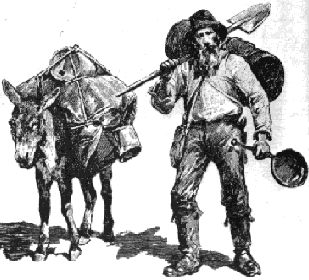 .…Appendix: 17th of March,
1849….I
have no doubt but you have made a good sale of your cattle this spring as I
suppose there is a very great demand for both oxen and mules for the California
emigration, but I will suggest to you that more can be made speculating in mules
than cattle. Oxen do well to cross the plains, but mules decidedly better, and
the latter are worth so much more after arriving here. As long as there is gold
mining and gold hunting in California (and that will be longer than you or I
will live) there is bound to be a great demand for mules. There can be no
substitute for them, they being the only animal that can pack burdens into the
mountainous regions of the mines. Mules are said to never die in the states, not
so here. Their days are few and full of trouble. We had remarkable good luck
with our oxen in crossing the plains, landing here with every one safe and
sound, not so good luck with my horse. The Indians stole him from me on the
Carson River. A word to Harriet---On your birthday I thought I would work for
your benefit, the result was at night I had two and one half ounces of gold for
you. Poor Selden’s birthday came on Sunday, but he shall have proceeds of some
other day when I am in a rich place. Herbert’s shall also be remembered, and
also little Harriet Ellen’s. My most ardent love to you and my dart children,
though we are very far distant from each other, may the Lord grant we may yet
meet again and live together in peace and prosperity. Affectionately, A. R.
Grout
.…Appendix: 17th of March,
1849….I
have no doubt but you have made a good sale of your cattle this spring as I
suppose there is a very great demand for both oxen and mules for the California
emigration, but I will suggest to you that more can be made speculating in mules
than cattle. Oxen do well to cross the plains, but mules decidedly better, and
the latter are worth so much more after arriving here. As long as there is gold
mining and gold hunting in California (and that will be longer than you or I
will live) there is bound to be a great demand for mules. There can be no
substitute for them, they being the only animal that can pack burdens into the
mountainous regions of the mines. Mules are said to never die in the states, not
so here. Their days are few and full of trouble. We had remarkable good luck
with our oxen in crossing the plains, landing here with every one safe and
sound, not so good luck with my horse. The Indians stole him from me on the
Carson River. A word to Harriet---On your birthday I thought I would work for
your benefit, the result was at night I had two and one half ounces of gold for
you. Poor Selden’s birthday came on Sunday, but he shall have proceeds of some
other day when I am in a rich place. Herbert’s shall also be remembered, and
also little Harriet Ellen’s. My most ardent love to you and my dart children,
though we are very far distant from each other, may the Lord grant we may yet
meet again and live together in peace and prosperity. Affectionately, A. R.
Grout
....P.S. March 20, 1850---I have broken open
this after having it sealed to inform you hat Mr. Greenwell has returned from
the city and with him brought me a letter , yes sir a letter, and better than
all I was by that informed I actually, as of the 2nd of December,
1849, friends still alive!! Ten thousand thanks to good sister P.H., for hers
and she may expect a good long letter from me the next mail after this. Wm.
Greenwell bought news that S. Williams is nearly well.
May 30, 1850, Weberville, California
My Always true sister P.H.,
.…You speak of having written me monthly
and say you will continue so to do, for kindness I do mores sincerely thank you
and acknowledge I owe you an apology for the rather severe rebukes or
reflections cast toward my friends at large and in general in some of my letters
for lack of attention to duty. But it may be my letters have met the same fate
of yours, delayed and probably destroyed on the way. I am in great hopes I may
now hear from you every month, as by the one received I see you have taken the
plan of sending by way of New York which is a good idea. Persons from the
eastern part of the States get their letters and have all winter with great
regularity. I have not heard directly from Samuel for 3 or 4 weeks, was he sick
or seriously so he would be certain to let me know it.
.…I have before written about his
separating from me, but will write again. Last winter there was a good deal of
excitement here about some diggings somewhere on head waters of the Sacramento
(River) where some men had last fall taken gold by the mule load. A great many
parties left here in search of these rich mines, in the midst of the rainy
season. Business being pretty dull with us, Samuel concluded to along. I was
altogether opposed to the plan, particularly at that season, but you know to
oppose Sam is but to urge him on. He has been back twice, thinks he has found
where he can get just as much as he wants of the big chunks, as soon as the snow
and water leave so as to work to advantage. How he will succeed is very
uncertain for you must know though there are thousands of rich deposits of gold
in California, it is but few in comparison to the number of persons searching
for them. I will venture one remark respecting brother Sam---if you ever see him
he will have gold in abundance. It will probably be years before he finds his
pile, but he will not leave California without it. Neither would I if it was not
that there are those I love more and better than gold. How often have I thought,
O could California have told her treasures about the time I left you in
Maryland, how happily I could have toiled on here until my "wishes were all
freighted," but less will do me now than would at that period of my life.
.…Among our near neighbors last winter was
an old bachelor and his nephew originally from East Tennessee, but from Buchanan
County, Missouri to this place. The nephew died last January. I was with them a
god deal during the sickness of the young man, and never saw more devoted
attention than this old man paid his poor nephew. Well, when Samuel and William
Greenwell both left me, I accepted the old man’s invitation to live and work
with him. His name is McCray, and should I die without other arrangements, he is
my confidant.
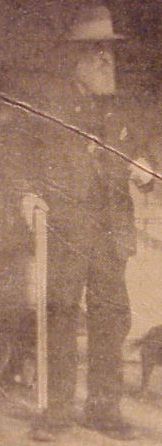 William Greenwell, one of the forty-niners from Monroe County, Missouri
accompanied Alden Rice Grout to the Gold Rush in California, stands holding his
shotgun. He never married.
William Greenwell, one of the forty-niners from Monroe County, Missouri
accompanied Alden Rice Grout to the Gold Rush in California, stands holding his
shotgun. He never married.
.…It is not possible to write just what we
make per day, as there is no regularity as to the amount of gold a man can make
digging for it. It is a "streak of lean and a streak of fat," more
streak of lean than fat!! But for the last two months, we have averaged about
$5.50 per day each, though some days we have made $50, other not one!
.…Sister P.H., your kindness towards
Herbert and Selden can never by me be repaid, but it likewise will never be
forgotten. Tell them I am more anxious for them to be good boys in school and
learn fast than I am to get much gold. Yours truly,/s/A.R. Grout
To Harriet Ann Grout: My dear Wife,
.…Yours is at hand, I had entirely given up
all hopes of ever receiving a line from you, but how often are we deceived in
things of this world. On this I am twice deceived, you were the first one I
looked for a letter from, and I find you last to get one from. But late as it
has been in coming, most gratefully it is received.
.…I rejoice that you are more willing to
deprive yourself the company of Herb and Sel than that they should not be at
school now while it is so important they should be learning something.
.…You say James Gough is for California
this spring. Well, if he has not now got his foot in it, I would not say so, but
let him come on. If there is not some shaking hands when I get to see him here,
it won’t be my fault. You say all the young men except those who have married
since I left are for California. Well just as they can afford, but if they would
take my advice they would stay where they are, or anywhere before California. If
they expect to get rich by merely coming here as thousands of others have seemed
to imagine, they could just as well turn right around and go back. Crowds are
here who because they can’t just by digging a hole and going to washing get
gold, and that too by the ounce or two a day, curse the diggings and turn to
roving from one part of the mines to another. But if one will persevere and not
become discouraged, he can make some come sure. I have been writing this letter
at intervals between working in the morning, noon, and night while bread is
baking. My partner and I have washed out since Monday morning $180 at $15 per
ounce, try. If we would work tomorrow I am satisfied we could make out $200. You
may think this does not sound much like $5 per day; to explain this, you must
understand, as this prospect where we got this out I presume is pretty nearly
exhausted. We may try for months before we find another as good. If I could only
have such diggings every day, I would soon be ready to return home. As it is, I
cannot tell when I will, though I hope to in the fall.
.…I am obliged to Buren that he still
remembers 'em, but I do not know as I now think of anything to write that would
interest him particularly, but should he think of coming out here I will just
inform him that though tobacco is very cheap, whiskey is $6 per gallon, no
insinuations, of course, if taken I presume he will consider where they come
from. Thinking of Buren brings Ring to mine: I hope and trust Buren has been
true to his promise and is taking good care of his honor.
.…I am not over agreeably situated as to
eatables, we can get no vegetables except at such enormous rates that a person
might almost as well starve as to buy them. We live altogether on fresh beef and
bread. Beef is now only 30 cents per pound, it always has been much higher. We
live in a snug little cabin 10 feet by 19 feet, have a comfortable bed to sleep
on, no children to trouble us, but mosquitoes, lizzards, and pismires are
somewhat troublesome. I make light bread from the yeast you prepared me which is
hard to beat, but we lack good butter to eat with our hot rolls. What butter we
get is as strong as a yoke or oxen and is $2 a pound at that. I do not really
wish you here Harriet, but were you, there is but little doubt we could in 122
months time make money enough to do us our lifetimes. Men who have the right
kind of wives here are making more money than any others by keeping tavern.
$1.50 is the price of a meal here that does not really cost more than 25 cents,
and there are many places where they are crowded all the time with customers.
There is not at this time any sickness at all among the miners as far as I can
learn, but it was dreadful here during the rainy season. They were dying daily
like sheep with the rot among them. Tell L.A. Saunders he may soon expect to
hear from me, also B.J. Gough, I have written F. Minor and George B. Gough, but
perhaps they never received the letters. Give my respect to all inquiring
friends, your mother and family in particular and believe me as every your
affectionate husband./S/A.R.Grout
July 7, 1850, American Fork House
(this is in reference to the south fork of the American river)
.…It is no 9pm and I am very tiered, but
think I must not let another mail leave California without letting you know I am
still alive and well. You perceive by this letter I changed my residence. I am
now living 10 miles from Sacramento City, on the big road leading to the mines
from the city. I am waiter, servant, steward, chief cook and bottle washer,
either or all if you please, in a large hotel. The proprietors of the house I
became partially acquainted with last winter, and one of them happening at
Weberville about 8 weeks since asked me what I would charge per month to assist
them in their business. I told him $200 per month; he told me come on. This
accounts for my quitting the diggings, but unless they raise my wages, I shall
return to the mines, for my work is too fatiguing for my wages. I am up at four
in the morning and do not get to bed until ten. Through my work is not hard, I
am kept almost constantly on my feet, otherwise I am pleasantly situated. It may
be I shall not return to the mines as I am informed I give great satisfaction to
my employers. They may raise my wages.
.…I have not heard a word from brother
Samuel or W. Greenwell for more than a month. The last I did hear they were not
doing much as the snow and water had not sufficiently left the mountains for
good mining operations. The emigrants by way of the plains are now coming in
daily, but I have not seen any from Missouri. I hope I shall soon have the
pleasure of seeing James Gough, but presume he did not start so early as those
who are now coming in.
.…Last week I received a letter from
Marcellus, dated April 1 one month later than your 1st that I have received. He
writes he had abandoned the notion of coming to California for the present. I
think he has acted wisely by so doing, but I have not time now to give my
reasons why. I intend as he has requested to give him my views on the subject
the first chance I have of writing a long letter. I saw John Nickels the other
day, he is driving a team from the city to the mines. I think he told me he
received $8 per day. He looks better than I ever saw him. I had but little time
to talk to him, he said he had heard that one of the boys who came in mess with
me was dead, he thought it was John McKay
.…Next Wednesday is Herbert’s birthday.
Well, as I am not at work in the mines I will make him a present of my wages,
and interest on money loaned out for that day. I have just figured it up, I find
it amounts to a little over $9 per day. Sundays included. And little Hatty’s
is not far off, though I hope to be getting a little more by that time. Silden
if he learns well at school and is a good boy which I have no doubt he is, shall
have my best day’s work in California Herb, it isn’t because I love Sell
better than you, it is because the poor boy has been unfortunate in losing one
of his eyes.
.…I am very tired and sleepy, and that isn’t
all, the fleas are so troublesome I can hardly sit still. When I begin to write
you I have so much I would like to write I do not know how to condense it into a
letter. Continue to write me monthly, as ever I am sincerely yours, /S/A.R.
Grout
October 21, 1850, American Fork House
My Dear wife,
.…I write this to inform you when, if not
before, I shall positively (Life being spared) start for Missouri. I shall start
ether on the 15th of December or more probably 1st of
January streamer. I am not making and could continue through this winter to make
more money than since I have been here, but my health is not as good as I could
wish and I do not feel willing to risk staying through the rainy season. Do not
infer that there is anything of a serious nature the matter with me, the fact is
I am nearly broke down with constant hard work. I have not the least doubt but a
few weeks rest would completely restore me to my former good health.
.…James Henry Gough is at this time hauling
hay for me. His health is good. He has often and repeatedly promised me he would
write home, and I shall not let him know that I have written this in hopes he
may still write by next steamer. I know his friends, wife particular are anxious
to hear from him. He knows it too, but he is just the same old easy Jim Gough he
used to be. There is a great deal of sickness among this year’s emigration,
and we often hear of cholera at the city, but I think so far there has been
none.
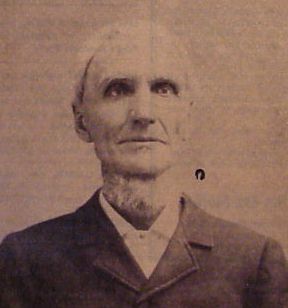 James Henry Gough, a brother of Harriet Ann Gough Grout and George Bevan
Gough, traveled to California in 1850 to join Alden Grout in prospecting for
gold.
James Henry Gough, a brother of Harriet Ann Gough Grout and George Bevan
Gough, traveled to California in 1850 to join Alden Grout in prospecting for
gold.
.…this is the last letter I expect to write
from California until I see you. Brother Samuel has sold out his blacksmith shop
and gone again to the mines. He was in good health and spirits two weeks since.
He does not know when he will return but seems more anxious to have me go home
than I am to go myself. I have a specimen each from him to sisters Harriet and
P.H. I commenced sometime ago to write to Marcellus, but lacked opportunity to
finish it. He will now have to wait for a personal interview for a description
of existing things in Goldom from me.
.…I think probably I shall return by way of
New York on account of visiting sisters Mary and Ellen. The difficulty of
traveling through that part of the states at that season may deter me from it.
No more until I see you. Affectionately yours,/S/A.R. Grout
End Notes:
.…Alden Grout returned to his home and
family in Shelby and Monroe County, Missouri, in December of 1851 or early in
1852, as a baby daughter, Mary Lyon, was born to the couple December 26, 1852.
Four more children followed, Fran Minor in 1852, twins Ann r. and Alden Rice,
Jr., born in 1856, and the youngest, Lillian Isabelle, in 1858. Their 13 year
old son Selden died in March of 1857, and the youngest son Alden, Jr. in 1861.
.…Alden Grout died in 1862 and his wife
Harriet Ann in 1863, leaving their children orphaned. They were looked after by
their aunts and uncles and lived to be grown. No doubt Alden Grout used some of
his earnings from the Gold rush to buy additional land. A land transaction is
recorded in 1853 in the Court House at Shelbyville. The final settlement of
Alden Grout’s estate was made in 1877 when his youngest child became of age.
His legacy of letters which reveal so much of his noble character and
personality will continue to be a source of interest and inspiration for his
descendants and scores of others for many years to come.
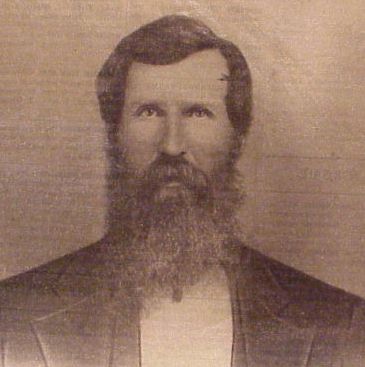
George Bevan Gough, a brother of Harriet Gough Grout, acted as an overseer of Alden Grout’s farm while he was away panning gold in California. Gough ‘s body was first interred in the St. Peter’s Cemetery at Jonesburg/Clinton (Northfork). Many years later his son Will Gough had his body moved to the St. Mary’s Cemetery in Shelbina. Many of the Gough Family are still interred at Jonesburg/Clinton.
EARLY CALIFORNIA PRICES CURRENT.--Delano's "Life on the Plains and at
the Diggings," gives the following as the prices paid at Lassen's Ranch, on
September 17, 1849:
Flour, per 100 pounds .......... $50.00
Fresh beef, per 100 pounds .......... 35.00
Pork, .......... 75.00
Sugar, .......... 50.00
Cheese, per pound .......... 1.50
H. A. Harrison, in a letter to the "Baltimore Clipper," dated San
Francisco, February 3, 1849, gives the following price-list:
Beef, per quarter .......... $20.00
Fresh Pork, per pound .......... .25
Butter, per pound .......... 1.00
Cheese, per pound .......... 1.00
Ham, per pound .......... 1.00
Flour, per barrel .......... 18.00
Pork, per barrel .......... $35 to 40.00
Coffee, per pound .......... .16
Rice, per pound .......... .10
Teas, per pound .......... .60 cents to 1.00
Board, per week .......... 12.00
Labor, per day .......... $6 to 10.00
Wood, per cord .......... 20.00
Brick, per thousand .......... $50 to 80.00
Lumber, per thousand .......... 150.00
William D. Wilson, writing to the "St. Joseph Valley Register," on
February 21, 1849, gives the following schedule of prices at Sutter's Fort:
Flour, per barrel .......... $30 to $40.00
Salt Pork, per barrel .......... 110 to 150.00
Salt Beef, .......... 45 to 75.00
Molasses,.......... 30 to 40.00
Salt Salmon .......... 40 to 50.00
Beans, per pound .......... .20
Potatoes, .......... .14
Coffee, .......... 20 cents to .33
Sugar, .......... 20 cents to .30
Rice, .......... 20 cents to .30
Boots, per pair .......... $20 to 25.00
Shoes,.......... 3 to 12.00
Blankets .......... 40 to 100.00
Transportation by river from San Francisco to Sacramento, he says, was $6 per
one hundred pounds. From Sacramento to the mines by team at the rate of $10 for
every twenty-five miles.
John H. Miller, writing to the "St. Joseph
Valley Register," October 6, 1849, gives the following prices at Weberville,
60 miles from Sacramento:
Wagons .......... $40 to $80.00
Oxen, per yoke .......... 50 to 150.00
Mules, each .......... 90 to 150.00
Board, per meal, $1.50, or per week .......... 21.00
Beef, per pound .......... 40 cents to .75
Salt Pork, per pound .......... 40 cents to .75
Flour, per pound .......... 25 cents to .30
Sugar, per pound .......... 30 cents to .50
Molasses, per gallon .......... $2 to 4.00
Mining Cradles .......... $20 to 60.00
Mining Pans .......... $4 to 8.00
Monroe
Co MO GenWeb Page
Ralls
Co MO GenWeb Page
Shelby Co MO GenWeb
Page
St. Peter's Catholic Cemetery in Old Clinton
Site page
links:
[] Fayette
History and my Genealogy Index []
Iowaz Sitemap [] Send
email []
Any reproduction of this site or it's contents requires express written consent.

Barry Zbornik
625 N. Section
Hannibal, MO 63401